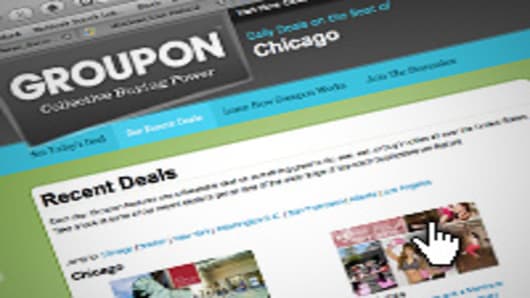And what would Google get for the money?
A two-year-old company that’s said to be doing $50 million a month in revenue. It serves more than 150 markets in North America and 100 outside that. Groupon makes money by offering subscribers just one local deal each day, contingent on enough people signing up for it.
It’s a nice concept, and if Groupon has been pulling in $50 million in recent months, that’s impressive for such a young company. But here’s the problem: I have a hard time seeing any significant intellectual property Groupon has created here. I have a hard time discerning any significant barriers to entry that would keep a company like Facebook from coming in and eating Groupon’s lunch. And I have a really hard time seeing how the Groupon concept model as it now exists will scale.
Groupon offers just one deal a day in local markets, and it contacts subscribers via e-mail. Nothing terribly complicated about that. There’s no sophisticated social network here, no unique commerce or payments platform. Just a small company offering direct deals to subscribers.
Heck, if Google is that desperate to get into the local advertising market, it should buy the largest newspaper company in the U.S.: Gannett . It’s trading at a $3.1 billion market cap, has 83 U.S. daily newspapers including USA Today, and tons of local assets including hundreds of local weeklies in the U.K. You know what else? Gannett has $5.5 billion in revenue (yes, nearly twice its market cap) and nearly 20% operating margins.
Yes, it also has old-media stigma, labor unions, and a lot of legacy issues that make it an unattractive acquisition target. But, Google: Do you want to own local advertising or not?
Technology companies like Google have long shied away from buying content creators, and for good reason: Content creation comes with troublesome costs and the business model isn’t nearly as sweet as offering technology platforms.
But here’s a prediction: Just as some tech powerhouses have realized they have to buy services companies to build scale and capture share of wallet, eventually ad platform players will realize they have to make plays in local media companies in order to rule local advertising.
And I’ll make you this bet: It would be a lot easier to fix a value-priced newspaper giant than it would be to turn Groupon into a business worth $6 billion
Questions? Comments? TechCheck@cnbc.comAnd you can follow Jon Fortt on Twitter @jonfortt



